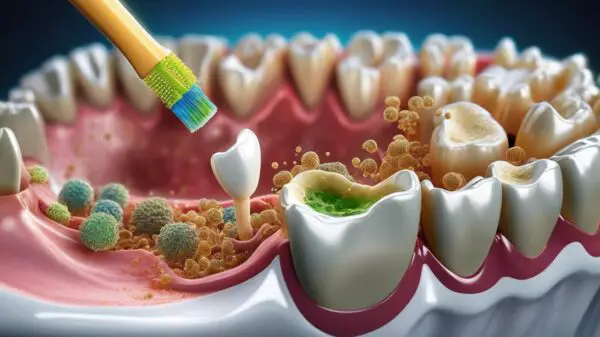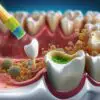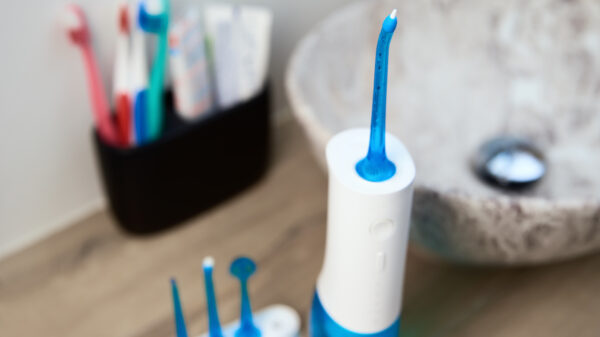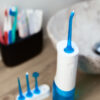We are instructed by dentists everywhere to floss our teeth every single day. However, many adults begin to stray from this habit. Most people will floss quickly before their routine dental exams but then forget about it again until their next cleaning rolls around. Today, we will discuss how often you really need to floss your teeth.
How often do you need to floss? Although there is much debate over this topic by various dentists, it is still best practice to floss your teeth once a day. Flossing is the best way to remove plaque, debris, and bacteria from between your teeth where your toothbrush can not reach.
While there are alternatives to flossing such as mouthwash or chewing gum, nothing compares to thorough flossing. Daily flossing will help you maintain a clean, bright smile. Failure to floss daily can have serious ramifications on your overall oral health as well as impact your gums and teeth negatively.

Reasons to Floss Daily
Flossing daily is an important part of proper oral hygiene. Although it may seem tedious at times, regular flossing is certainly worth the trouble. Failure to floss can result in a variety of conditions that affect both your gums and teeth. A few of the most common problems that occur due to failure to floss include:
- Gingivitis is an inflammation of the gums which occurs when bacteria become trapped between your teeth. If not reversed, it can lead to more serious forms of periodontal (gum) disease. Gingivitis can also be the cause of eventual tooth loss if it is not addressed in a timely manner.
- Red or Bleeding Gums commonly occur when one fails to floss regularly. Inflamed gums are typically a sign of early gingivitis or other periodontal diseases. Although you may think nothing of bleeding gums, this can be a huge warning sign that something is not right. If you are experiencing red or bleeding gums on a regular basis, talk to your dentist at your next visit. It is important to note that small amounts of bleeding will occur if you begin flossing for the first time in a while. It can take up to a week of consistent flossing for your gums to become acclimated to the procedure.
- Plaque becomes hardened between your teeth when it is not removed by proper flossing techniques. If the plaque is not removed regularly, it will eventually become tartar. Tartar is a mineral deposit that unfortunately can only be removed by a dental professional.
- Tooth Decay can also occur when food or bacteria is trapped between teeth for an extended period of time. Tooth decay will likely result in more serious dental procedures and even eventual tooth loss. Decaying teeth can also cause gum disease and the problems associated with it.
- Halitosis is simply a fancy word for bad breath. Failure to floss your teeth can be the leading cause of that bad breath you can’t get rid of.
- Cavities are often mentioned in relation to brushing your teeth. However, daily flossing is just as important as brushing when it comes to keeping cavities at bay.
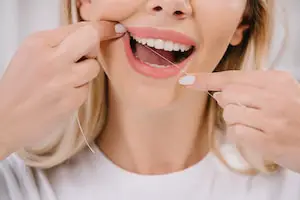 Alternatives to Flossing
Alternatives to Flossing
While daily flossing crucial to your oral hygiene routine, it is possible that regular dental floss is not the best option for you. Your dentist will be able to best assess what method of flossing best fits your needs. There are several alternatives to flossing that produce a similar end result – a clean, healthy smile. Other types of interdental cleaners include water flossers, wooden plaque removers, air flossers, dental floss picks, pre-threaded disposable flossers, or tiny brushes to reach those small spaces.
Water flossers use a steady pulse of water to clean the debris and bacteria from between the teeth. Dentists commonly recommend water flossers for individuals that struggle with traditional flosses, such as patients with several dental bridges or crowns. Water flossers are also a valuable alternative for the elderly or anyone else who struggles with the fine motor skills required for thorough flossing.
Your dentist will happily recommend a flossing alternative should you find that you need one. If you are concerned that your current flossing routine is not effective enough, your dentist should be able to give you some helpful tips along with plaque disclosing tablets which will stain any plaque that remains after brushing and flossing. These tablets can be a great way to assess areas of your mouth that require more attention.
Should I floss before or after eating?
We’ve established that it’s important to floss once a day. However, does it matter when you floss? Should you brush your teeth first or floss first? As long as you are doing a thorough job of both brushing and flossing, the order in which you do those tasks is irrelevant.
Dentists recommend flossing first as flossing removes the food debris from between your teeth. When you follow flossing by brushing your teeth, you are able to brush all of that loosened debris away.
On the other hand, many recommend brushing first as it gets rid of all the loose debris and leaves less to floss. Brushing first may also be desirable as it leaves you with a fresh mouth to then floss.
Should I floss before or after eating? Dentists agree that flossing is most effective when done in the evening after your last meal. This will prevent food debris from staying trapped between your teeth overnight.
At the end of the day, the sequence is not important. Once you find a routine that works well for you, stick with it! As long as you both brush your teeth and floss daily, you are on the right path to optimal oral hygiene.
When to Avoid Flossing
As with anything, there are exceptions to the rule. There are certain times when flossing your teeth will do more harm than good. Your dentist and doctor will be able to advise you if flossing is harmful to you for any reason. However, as a general rule of thumb, anyone with an infection or weakened immune system should refrain from flossing.
Diseases such as concern, or any other disease that thins the blood, are also reasons to stop flossing temporarily. Weakened immune systems typically lead to sensitive gums which will, in turn, bleed more easily than normal. Because of the weakened immune system, open sores could occur which may become infected before they can fully heal.
If you are concerned that flossing may not be the best choice for you right now, schedule an appointment with your local dentist office. They will best be able to evaluate your situation and weigh the benefits and risks. They will also be able to suggest flossing alternatives to practice until you return to full health.
Final Thoughts
Daily flossing is an essential part of proper oral hygiene. Failure to floss daily can result in a variety of conditions affecting your teeth and gums. Gingivitis, cavities, bad breath, tooth decay, and plaque buildup which turns into tartar are all caused by improper flossing habits.
If traditional flossing is causing you pain or unnecessary trouble, there are alternatives. Your dentist will be able to suggest which method is the best for your situation. Many dentists suggest water flossers as the best alternative to traditional floss. If you have any concerns about your flossing routine, The Dental Studio of South Tulsa would be thrilled to assist you in any way.
There are certain individuals who should avoid flossing their teeth, at least for a time. Many diseases, such as concern and other autoimmune diseases, weaken the immune system. In these situations, flossing may cause more harm than good. Your doctor or dentist will be able to advise you in the proper flossing protocol for your individual situation.
Related Questions
Can I floss while I have braces?
Can I floss while I have braces? Yes, flossing while you have braces is arguably more important than flossing without braces! Although flossing becomes more challenging with braces, it is an essential part of caring for your oral health. Flossing with braces is often frustrating and time-consuming. Your orthodontist should recommend several alternatives to traditional flossing to practice during this time. The most common way to floss while you have braces is by using a floss threader to get between your braces or a water flosser. Some orthodontists will even gift their patients with a water flosser upon receiving their braces.
Taking care of your teeth while wearing braces can be rather tedious. However, keep in mind that this is only for a short time. Maintaining proper oral hygiene will play a large part in receiving the best orthodontic care.
How is Floss Made?
According to the American Dental Association, dental floss was “once made from silk fibers twisted to form a long strand”. However, because of advancements in dental technology, dental floss is now either plastic monofilaments or nylon filaments. There are many varieties of floss. Both waxed and unwaxed floss as well as flavored floss to make the experience more pleasant. The specific type of floss you choose to use is up to you. As long as you are flossing thoroughly and with proper technique, all varieties of floss will give you the same results.
Can you use dental floss more than once?
Many people today are concerned about eliminating single-use products. You should only use floss one time. Floss can begin to fray after one use which would render it ineffective. Used floss can also spread bacteria into your mouth which is exactly what you are trying to get rid of. If eliminating single-use products is important to you, a water flosser may be the best option.










